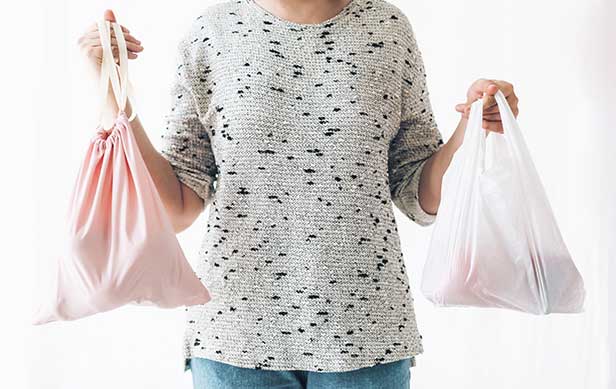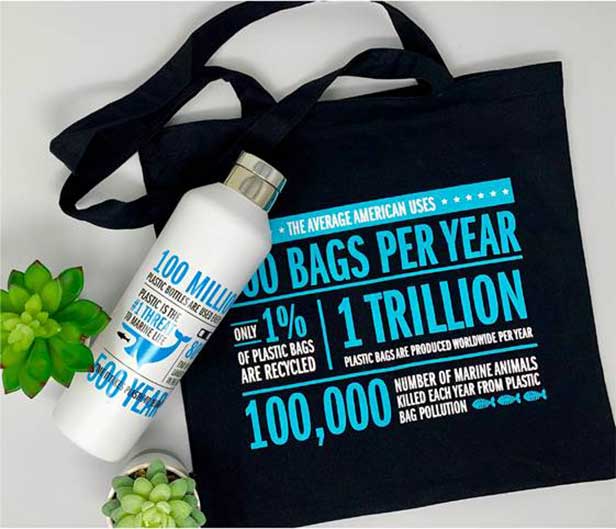Product Hub February 27, 2020
Promo’s Opportunity in NY Plastic Bag Ban
Empire State distributors see the prohibitions, which take effect Sunday, as a chance to sell more branded reusable bags.
Prohibitions on single-use plastic bags take effect Sunday, March 1 in New York – the United States’ fourth most populous state and home to the nation’s largest city.
Some promotional products distributors are gearing up to capitalize on the ban, which they view as an opportunity to sell more branded reusable alternatives, such as totes.

“The ban is absolutely an opportunity to sell more reusable bags, and it helps our positioning as a brand partner,” Joseph Sommer, owner of New York City-based distributorship Whitestone Branding (asi/359741), told Counselor. “The ban allows us the opportunity to educate our clients on how to use product to bring more attention to their brands.”
NYC-based Axis Promotions powered by HALO (asi/128263) is excited about the prospects, too. “I definitely see the ban on single-use bags as a big opportunity for all of us to sell more branded reusable bags to our clients,” Axis EVP Joan Bluestone Landorf told Counselor. “Most of our clients are already avoiding plastic bags and some of our beauty clients absolutely forbid using any plastic packaging.”
Under the New York law, any store or seller that collects tax is prohibited from handing out thin plastic carryout bags for the purpose of holding and/or transporting purchased goods. Particularly, the law defines such bags as those made from plastic film that has a thickness of less than 10 mils, which is 1/100th of an inch.
New York’s plastic bag ban starts March 1, 2020, and will help reduce pollution and protect fish and wildlife. You can do your part by bringing your own reusable bag to retail stores. Learn more from @NYSDEC about the upcoming plastic bag ban: https://t.co/sfoNOLNY7P #BYOBagNY pic.twitter.com/k1Jl20GhKR
— NY Power Authority (@NYPAenergy) February 25, 2020
There are exceptions. Stores, for instance, can still package meat and fish in thin plastic bags. Bulk items like fruit, vegetables, grains, candy and small hardware like nuts and bolts can come in the plastic bags, too.
In other instances where the ban does apply, however, consumers’ options will essentially be to pay a five-cent per-bag fee for paper bags to transport their goods (should local cities/counties decide to require the fee; they have the option) – or bring their own reusable bags to carry purchases. “The entire point of the ban is to encourage people to use reusable bags, a move the state hopes will cut down on single-use plastic that often litters streets, trees and bodies of water,” the Democrat & Chronicle reported.
In advance of New York’s ban on single-use plastic bags, which goes into effect on March 1, today DEC Region 1 Director Carrie Meek Gallagher delivered reusable bags to @LongIslandCares, the Harry Chapin Food Bank, one of the nine member food banks of Feeding New York State. pic.twitter.com/JybIO2vlTj
— NYSDEC (@NYSDEC) February 25, 2020
In that impetus, promo pros see a chance to stimulate sales and strengthen relationships with clients. Sommer believes the biggest winners will be the ad specialty distributors who already do business with grocery stores/chains. Even though that’s not a niche his Whitestone Branding is in, he’s already seeing enthusiasm from clients in other industries – and making the most of it.
“Because of the coming ban, we’ve seen an uptick in the interest for reusable bags,” Sommer told Counselor. “Corporate clients are asking for options, and we have certainly hopped on the wave. Companies are ordering them just to have on hand and give to their people, which is satisfying and refreshing to see.”
Axis is getting similar interest from customers. “We have been seeing an increase in reusable bags among our New York-based clients,” Landorf told Counselor. “We have been presenting reusable bags to clients for many years as an alternative to plastic single-use bags.”
The savvy marketing includes self-promotions centered on a custom-printed reusable bag. Based on a design by Axis graphic designer Jon Porcasi, the bag features eco-focused facts that the Axis team shares with clients. “We often pair it with a custom printed water bottle with an eco message about not using plastic single-use water bottles,” Landorf said.

Axis’ eco-focused tote and water bottle. The distributorship uses these for self-promotion and to educate clients.
A growing number of cities, municipalities, states and even countries are enacting prohibitions on single-use plastic bags. It’s part of an effort to reduce plastic bag litter and pollution. Ban proponents say the pollution spoils natural habitat and poses a danger to wildlife, which can choke on or become caught in the disposables. States like California, Maine and Vermont have voted statewide prohibitions on plastic bags into place.
😮😠It's heartbreaking to see beaches looking like this. We *must* use this emotion and awareness to fuel change.
— SurfersAgainstSewage (@sascampaigns) February 17, 2020
We can't just forget plastic once it's rehidden in the ocean.
🛑 RT if you'll keep pushing for brands to stop making pointless plastic.https://t.co/RU8aO5chiN
In 1950, the world’s population of 2.5 billion produced 1.5 million tons of plastic, according to Surfers Against Sewage, a marine conservation charity based in the United Kingdom. In 2016, a global population of more than 7 billion people produced more than 320 million tons of plastic. The 2016 tally is set to double by 2034. Every day, approximately 8 million pieces of plastic pollution find their way into oceans, according to Surfers Against Sewage.

Product Hub
Find the latest in quality products, must-know trends and fresh ideas for upcoming end-buyer campaigns.
